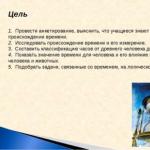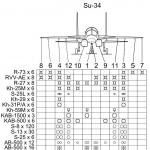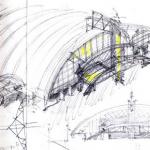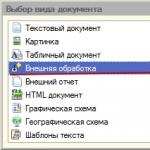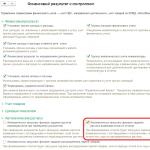Job description for a geologist (deputy director for geology). “Qualification directory of positions for managers and specialists of geological and subsoil exploration organizations Job description for a specialist in the field of geological exploration
Name of organization APPROVED POSITION Name of position INSTRUCTIONS of the head of the organization _________ N ___________ Signature Explanation of signature Place of compilation Date TO GEOLOGIST
1. GENERAL PROVISIONS
1. A geologist belongs to the category of specialists, is hired and dismissed from work by order of the head of the organization.
2. A person who has a higher technical (geological) education without requirements for work experience or secondary specialized education and work experience as a category I geological technician for at least 3 years is appointed to the position of geologist.
A person with a higher technical (geological) education and work experience as a geologist of at least 3 years is appointed to the position of category II geologist.
A person with a higher technical (geological) education and work experience as a category II geologist of at least 3 years is appointed to the position of category I geologist.
3. In his activities, a geologist is guided by:
Regulatory documents on the work performed;
Methodological materials relating to relevant issues;
Charter of the organization;
Rules labor regulations;
Orders and instructions from the head of the organization (immediate supervisor);
This job description.
4. A geologist must know:
Regulatory legal acts, other guidance, methodological and regulatory materials of higher authorities relating to geological production activities organizations;
Geology of the oil and gas bearing area and field;
Rules for the development of oil and gas fields;
Industry requirements for the type of raw material produced;
Existing methods of field and geophysical surveys of wells;
Methods of drilling and operating wells and characteristics of the equipment used;
Fundamentals of drilling technology, current and overhaul of wells;
Fundamentals of economics, organization of production, labor and management;
Rules for preparing geological documentation;
Principles and methods of constructing graphical, geological documentation and processing of logging material;
Accounting and rules for storing geological materials;
Fundamentals of the Code of the Republic of Belarus on Subsoil Resources, fundamentals of the Law "On the Protection environment";
Fundamentals of labor legislation;
Rules and regulations of labor protection and fire safety.
5. During the absence of a geologist, his duties are performed in the prescribed manner by an appointed deputy, who bears full responsibility for their proper performance.
2. JOB RESPONSIBILITIES
6. To perform the functions assigned to him, the geologist must:
6.1. Monitor the state of development and development of oil, gas fields and underground gas storage facilities (UGS).
6.2. Monitor the position of oil-bearing contours and the rise of oil-water contact in oil fields, gas-water contact in underground storage facilities, ensure timely adoption of measures for the correct location of the gas-water contact contour in underground storage facilities.
6.3. News primary documentation based on incoming information on oil and gas production, well drilling, geophysical and hydrogeological studies.
6.4. Carry out operational geological control over the progress of gas injection and withdrawal from underground storage facilities, drilling, testing, quality and volume of execution research work, major repairs, technological operating mode at oil and gas wells.
6.5. Carry out constant geological control throughout the entire well construction cycle to complete the geological part of the project and theological and technical work.
6.6. Monitor the implementation of the declared geophysical complex and the quality of field geophysical research.
6.7. Based on geophysical survey data, determine areas of complications in wellbores and intervals for installing packers when testing a well during the drilling process.
6.8. Timely clarify current reservoir pressures and drilling fluid parameters before opening productive horizons and provide information to the technological service and drilling rigs.
6.9. Draw up documentation of mining drilling allotments for subsoil development, geological reports, plans (schedules) for field and geophysical surveys of wells, sampling for chemical analysis.
6.10. Process well logs.
6.11. Conduct a monthly analysis of the operation of the well stock.
6.12. Participate in the development and implementation of technological regimes for well operation, development of geological and technical measures.
6.13. Prepare the geological part of the geological and technical work order for drilling wells.
6.14. Compile graphic materials characterizing the geological structure of the study areas (schemes, maps, sections, diagrams).
6.15. Organize recording, storage and reproduction of geological materials in the prescribed manner.
6.16. Prepare documents for liquidation, conservation and return of wells.
6.17. Participate in the exchange of work experience and professional development of personnel.
6.18. Maintain established statistical reporting.
6.19. Stop work on well construction if the rules for protecting subsoil and the environment are violated.
6.20. Provide assistance and cooperation with the employer in ensuring healthy and safe working conditions, immediately report to the immediate supervisor about each case of industrial injuries and occupational diseases, as well as emergency situations, which pose a threat to health and life for him and others, discovered shortcomings and violations of labor protection.
6.21. Take necessary measures to limit development emergency situation and its elimination, provide first aid to the victim, take measures to call an ambulance, emergency services, and fire brigade.
3. RIGHTS
7. A geologist has the right:
7.1. Get acquainted with draft decisions of the organization’s management relating to its activities.
7.2. Submit proposals for improvement of work related to the responsibilities provided for in this job description for consideration by management.
7.3. Inform your immediate supervisor about any issues identified during the execution of your duties. job responsibilities shortcomings in the production activities of the organization (its structural divisions) and make proposals for their elimination.
7.4. Request personally or on behalf of the immediate supervisor from the heads of departments of the organization and specialists information and documents necessary to fulfill their official duties.
7.5. Involve specialists from all (individual) structural units in solving the tasks assigned to it (if this is provided for by the regulations on structural units, if not, then with the permission of management).
7.6. Require the management of the organization to provide assistance in the performance of their official duties and rights.
7.7. Take part in the discussion of labor safety issues submitted for consideration at meetings (conferences) of the labor collective (trade union organization).
4. RELATIONSHIPS (JOB RELATIONS)
8. The geologist reports to ________________________________________________.9. The geologist interacts on issues within his competence with employees of the following structural divisions of the organization: - with _________________________________________________________________: receives: ________________________________________________________________________________; is: __________________________________________________________________________; - from _________________________________________________________________: receives: ________________________________________________________________________________; is: __________________________________________________________________________.
5. PERFORMANCE EVALUATION AND RESPONSIBILITY
10. The work of the geologist is assessed by the immediate supervisor (other official).
11. The geologist is responsible:
11.1. For failure to perform (improper performance) of one’s job duties as provided for in this job description - within the limits determined by the current labor legislation of the Republic of Belarus.
11.2. For offenses committed in the course of carrying out their activities - within the limits determined by the current administrative, criminal and civil legislation of the Republic of Belarus. 11.3. For causing material damage
- within the limits determined by the current labor, criminal and civil legislation of the Republic of Belarus. 11.4. For non-compliance with the rules and regulations of labor protection, safety regulations, industrial sanitation
and fire protection - in accordance with the requirements of regulatory legal acts of the Republic of Belarus and local acts in _____________________.
Name of the position of the head of the _________ _______________________ structural unit Signature Explanation of the signature Visas I have read the instructions _________ _______________________ Signature Explanation of the signature _______________________ Date
I CONFIRM:
_______________________________
_______________________________
[Job title]
_______________________________
[Name of company]
_______________________/[FULL NAME.]/
"_____" _______________ 20___
JOB DESCRIPTION
Geologist
1. General Provisions 1.1. Real job description
1.2. A geologist is appointed to a position and dismissed from a position in the manner established by current labor legislation by order of the head of a geological organization.
1.3. A geologist belongs to the category of specialists and is subordinate to [name of the position of the immediate supervisor in the dative case] of the organization.
1.4. A person with the appropriate qualifications is appointed to the position of geologist:
Geologist: higher professional (geological) education without requirements for work experience or secondary vocational (geological) education and work experience as a geological technician of category I for at least 3 years.
1.5. A geologist should know:
- laws and other regulatory legal acts in the field of geological study, use and protection of subsoil and the environment;
- organizational and administrative documents and methodological materials relating to methods of conducting geological research;
- geological knowledge and modern ideas about the geology of the work area (field, site);
- prospects for the development of geological work in the region and in the geological organization;
- basic status information mining industry in the region and the requirements for the types of minerals being studied;
- the procedure for designing, planning and financing geological exploration work;
- modern methods, organization and means of conducting geological research;
- types and methods of geological exploration work, as well as the main parameters of equipment and technology for their production;
- requirements for the quality of geological exploration work and geological materials;
- methodology for sampling and calculating reserves of the studied types of minerals;
- methods of mineral exploration and rocks;
- rules for accounting and storage of geological materials;
- kinds, specifications, rules for operation, maintenance and metrological support of equipment, instruments, equipment used in geological research;
- rules for maintaining and preparing geological documentation;
- advanced domestic and Foreign experience in the field of geological exploration;
- basic economics of mineral raw materials and geological exploration;
- basics of labor legislation;
- fire protection rules;
- labor safety regulations.
1.6. The geologist is obliged:
- respond to requests from other employees in a timely manner professional activity, provide the required information in full;
- treat other employees objectively, evaluate their contribution to achieving the organization’s goals based on the results of their work, regardless of personal attitudes;
- comply with established deadlines for completing tasks and instructions;
- provide assistance to work colleagues in solving problems of their activities in the event that assistance can lead to a qualitative improvement in performance results;
- continuously improve your professional level;
- honestly and conscientiously fulfill the duties assigned to him;
- keep the property in use safe and sound;
- to contribute in every possible way to the formation and strengthening of a favorable moral and psychological climate in the team;
- keep official and commercial secrets;
- comply with confidentiality rules when working with personal information of organization employees, internal labor regulations, labor protection, safety precautions, industrial sanitation and fire protection.
1.7. A geologist in his activities is guided by:
- local acts and organizational and administrative documents of the geological organization;
- internal labor regulations;
- rules of labor protection and safety, ensuring industrial sanitation and fire protection;
- instructions, orders, decisions and instructions from the immediate supervisor;
- this job description.
1.8. During the period of temporary absence of a geologist, his duties are assigned to [deputy position title].
2. Job responsibilities
A geologist performs the following labor functions:
2.1. Performs a range of geological studies in the study of subsoil and solving other geological problems.
2.2. Participates in the development of planning and design estimates, as well as in the organization and liquidation of field work.
2.3. Performs geological research in field and office conditions during prospecting, surveying, geophysical and other work of a geological nature.
2.4. Collects factual geological information and material, as well as documents it.
2.5. Analyzes, systematizes, summarizes geological information and other factual materials, carries out geological interpretation of geophysical and geochemical data.
2.6. Compiles graphic materials characterizing the geological structure of the study area (diagrams, maps, sections, plans, diagrams, columns, etc.).
2.7. Independently and with the participation of specialists, compiles reports on the geological results of work and develops other geological materials (technical and economic reports, condition projects, reserve calculations, etc.).
2.8. Ensures and monitors compliance with methodological provisions, instructions and requirements for the geological study of subsoil and the performance of geological exploration work.
2.9. Participates in mineral testing work.
2.10. Carries out geological supervision of technological research of mineral raw materials in industrial conditions.
2.11. Participates in the implementation of experimental, methodological and thematic work, in calculating mineral reserves, and in the development of new technical means and technologies.
2.12. Compiles reference collections of rock samples, determines the characteristics of rocks according to their technological properties (drillability, strength, loosening ability, etc.) and the category of geological complexity of the work areas.
2.13. Summarizes the materials of the geological fund on the geology of the study area.
2.14. Participates in the preparation and obtaining of licenses for geological exploration of subsoil, documents for land use during geological work, permits from other authorities (sanitary and epidemiological stations, basin supervision, forestry departments, etc.).
2.15. Compiles and submits accounting and reporting materials on geological research in the prescribed manner.
2.16. Ensures and monitors compliance with the rules for accounting and storage of geological materials, legislation in the field of geological study of subsoil, subsoil use, protection of subsoil and the environment, labor protection rules, fire protection rules for geological exploration.
2.17. Supervises the work of geological technicians and other performers.
In case of official necessity, a geologist may be involved in the performance of his official duties overtime, in the manner prescribed by the regulations federal legislation about work.
3. Rights
A geologist has the right:
3.1. Get acquainted with draft decisions of the organization’s management relating to its activities.
3.2. Submit proposals for improvement of work related to the responsibilities provided for by this job description for management's consideration.
3.3. Attend meetings of committees and working groups, and other meetings of employees in the area of activity.
3.4. Participate in discussions of issues related to the activities of the structural unit.
3.5. If necessary, interact with employees of all structural divisions of the organization.
3.6. Request personally or on behalf of the immediate supervisor from department heads and other specialists information and documents necessary to perform their job duties.
3.7. Sign and endorse documents within your competence.
3.8. Involve specialists from all (individual) structural divisions in solving the tasks assigned to him (if this is provided for by the regulations on structural divisions, if not, with the permission of the head of the organization).
3.9. Require the management of the organization to provide assistance in the performance of their official duties and rights.
3.10. Act on behalf of a structural unit and represent its interests in relations with other structural units of the organization within its competence.
3.11. Represent the structural unit in relations with external organizations in the area of activity within its competence.
3.12. Conduct official correspondence with structural divisions of the organization and external organizations on issues related to advanced training, training and development of personnel.
3.13. Make your own decisions about planning your working time.
4. Responsibility and performance evaluation
4.1 The geologist bears administrative, disciplinary and material (and in some cases provided for by the legislation of the Russian Federation, criminal) responsibility for:
4.1.1. Failure to carry out or improperly carry out official instructions from the immediate supervisor.
4.1.2. Failure to perform or improper performance of one’s job functions and assigned tasks.
4.1.3. Illegal use of granted official powers, as well as their use for personal purposes.
4.1.4. Inaccurate information about the status of the work assigned to him.
4.1.5. Failure to take measures to suppress identified violations of safety regulations, fire safety and other rules that pose a threat to the activities of the organization and its employees.
4.1.6. Failure to ensure compliance with labor discipline.
4.1.7. Offenses committed in the course of carrying out their activities - within the limits determined by the current administrative, criminal and civil legislation of the Russian Federation.
4.1.8. Causing material damage and/or losses to the company or third parties associated with actions or inactions during the performance of official duties.
4.2. The assessment of the geologist’s work is carried out:
4.2.1. By the immediate supervisor - regularly, in the course of the employee’s daily performance of his labor functions.
4.2.2. Certification Commission enterprises - periodically, but at least once every two years, based on documented results of work for the evaluation period.
4.3. The main criterion for assessing the work of a geologist is the quality, completeness and timeliness of his performance of the tasks provided for in these instructions.
5. Working conditions
5.1. The working hours of a geologist are determined in accordance with the internal labor regulations established in the organization.
5.2. Due to production needs, a geologist may travel to business trips(including local significance).
I have read the instructions ___________/___________/ “____” _______ 20__
Resolution of the Ministry of Labor of the Russian Federation dated December 20, 2002 N 82 “On approval qualification directory positions of managers and specialists of geology and subsoil exploration organizations.”
Developer: _________________
Agreed: _________________
______________________________
ID of the electronic copy of the document.
(PREAMBLE)
This job description has been developed and approved in accordance with the provisions Labor Code Russian Federation and other regulations governing labor relations in the Russian Federation.
Participates in the development and implementation of measures aimed at increasing the efficiency of drilling operations and labor productivity, introducing advanced equipment and technology for well construction, protecting the environment and subsoil, improving the organization and working conditions, and reducing the accident rate of work. Ensures and controls the accuracy and timeliness of execution of production and reporting documentation by members of the drilling crew. Carries out quantitative and qualitative records of work performed and time worked by team members.
Analyzes the production activities of the drilling crew. Maintains established documentation on the operation of equipment, records material assets, takes measures to ensure their safety and timely write-off. Ensures compliance with legislation on environmental and subsoil protection, including land reclamation when drilling wells.
Job description of a geologist engineer in surveys
Attention
Participates in the organization, conduct and liquidation of field geophysical work, receipt and storage of necessary instruments, instruments, field equipment and office processing of field materials. Participates in preparation for work and installation of instruments and other technical means for geophysical research and their maintenance. Fixes and draws up the results of recording geophysical observation data.
Info
Maintains primary geophysical documentation and carries out its processing, recording and storage. Performs engineering works when processing and interpreting geophysical data. Participates in the preparation of design and estimate documentation.
Participates in the preparation of text, tabular and graphic materials, and also performs technical correction of the text and preparation of reports on the results of geophysical research.
Participates in the implementation of experimental, methodological and thematic work, in calculating mineral reserves, and in the development of new technical means and technologies. Compiles reference collections of rock samples, determines the characteristics of rocks according to their technological properties (drillability, strength, loosening ability, etc.) and the category of geological complexity of the work areas. Summarizes the materials of the geological fund on the geology of the study area.
Participates in the preparation and receipt of licenses for geological exploration of subsoil, documents for land use during geological work, permits from other authorities (sanitary and epidemiological stations, basin supervision, forestries, etc.).
Compiles and submits accounting and reporting materials on geological research in the prescribed manner.
Ensures that the detachment completes planned tasks within the established time frame. Participates in the organization, conduct and liquidation of field work. Carries out assignments and issues tasks to performers of work and monitors their implementation.
Takes direct part in production process geological (geophysical, hydrogeological) study of the subsoil at the assigned work site, processing of field materials, writing a geological report on the research carried out. Provides accounting of the volume and quality of work performed, as well as registration and storage of geological (geophysical, hydrogeological) documentation and materials. Provides timely support to the squad necessary equipment, devices, tools, equipment and other material resources. Provides accounting and storage of material resources, as well as their distribution among workplaces.
1.6. Qualification requirements.
Geologist: higher professional (geological) education without requirements for work experience or secondary vocational (geological) education and work experience as a category I geological technician for at least 3 years.
2. FUNCTIONAL RESPONSIBILITIES
Performs a range of geological studies in the study of subsoil and solving other geological problems. Participates in the development of planning and design estimates, as well as in the organization and liquidation of field work.
Provides methodological assistance to employees of geological (geophysical, hydrogeological) divisions of the organization on issues of conducting geological exploration, design and reporting. Organizes interaction and conclusion of contracts with third-party organizations on issues related to the geological (geophysical, hydrogeological) activities of the geological organization. Coordinates and ensures the implementation of experimental, methodological and thematic work. Organizes and controls the preparation of geological (geophysical, hydrogeological) reports, reviews, condition projects, technical and economic reports, calculations of mineral reserves and reference collections of rock samples. Ensures the implementation of measures to improve the organization of labor and management of geological (geophysical, hydrogeological) work.
Qualification requirements. Category I surveyor: higher professional (technical) education and work experience as a Category II surveyor of at least 3 years. Category II surveyor: higher professional (technical) education and work experience as a surveyor of at least 3 years. Surveyor: higher professional (technical) ) education without requirements for work experience or secondary vocational (technical) education and work experience as a category I surveyor technician for at least 3 years.Cartographer
Job responsibilities. Performs work on drawing up maps, plans and other topographic, geodetic and geological graphic materials. Carries out the selection of geological and geodetic data for the preparation of graphic materials.Important
Organizes the issuance of explosive materials to blasters (explosive masters). Monitors the timely submission of reports by blasters on spent explosive materials and their remains. Carries out storage and control over the transfer of seals, keys to the storage of explosive materials and sealing pliers.
Controls the ratio of the amount of explosive materials in the warehouse and the installed storage capacity. Monitors the condition of the premises, the availability and serviceability of fire fighting equipment, equipment and inventory in the warehouse and ensures their timely maintenance and repair. Participates in the inventory of explosive materials. Controls and organizes correct management accounting warehouse operations, established accounting and reporting documentation. Organizes loading and unloading operations at the warehouse in compliance with the norms, rules and instructions for their production. Qualification requirements. Higher professional (geological, technical or engineering-economic) education and work experience as managers in the field of geology and subsoil exploration for at least 5 years.
Head of geological exploration (geophysical, hydrogeological) section
Job responsibilities. Manages the production, economic and geological exploration (geophysical, hydrogeological) activities of the geological exploration (geophysical, hydrogeological) site. Ensures that the site completes planned tasks within the established time frame.Responsibility and performance evaluation
4.1 The geologist bears administrative, disciplinary and material (and in some cases provided for by the legislation of the Russian Federation, criminal) responsibility for:
4.1.1. Failure to carry out or improperly carry out official instructions from the immediate supervisor.
4.1.2. Failure to perform or improper performance of one’s job functions and assigned tasks.
Illegal use of granted official powers, as well as their use for personal purposes.
4.1.4. Inaccurate information about the status of the work assigned to him.
4.1.5. Failure to take measures to suppress identified violations of safety regulations, fire safety and other rules that pose a threat to the activities of the organization and its employees.
4.1.6. Failure to ensure compliance with labor discipline.
Organizes the development of long-term and annual plans for geological exploration (geophysical, hydrogeological) work, geological (geophysical, hydrogeological) assignments for research objects, draft plans for the increase of mineral reserves. Ensures the development of the geological and methodological part of the design and estimate documentation for geological exploration (geophysical, hydrogeological) work, as well as the recording and write-off of costs for them. Organizes the keeping of records of the movement of mineral reserves according to the balance of the study area. Provides organization of field and office work, as well as laboratory and technological research of minerals, monitors their implementation. Organizes the implementation of decisions on rational use subsoil, licensing, accounting and reporting on geological materials.
The responsibilities of geological engineers include organizing and monitoring the conduct of engineering geological surveys. Such specialists develop a research program and participate in its direct implementation, processing of field materials and laboratory data. Geological engineers construct engineering geological sections, profiles, columns, and certificates of artificial structures. Their competence includes issuing reporting materials on geology, as well as protecting research materials in the examination bodies.
Moscow organizations offer geological engineers an income of about 48,000 rubles. per month. The average salary offers for vacancies in the northern capital are slightly lower - 46,000 rubles. Applicants for the position of geological engineer from Yekaterinburg can count on an average monthly salary of about 38,000 rubles, their colleagues from Nizhny Novgorod - 28,000 rubles. Data for other cities participating in the study are presented below (see tables).
Geological research does not tolerate amateurism, therefore, even from yesterday’s graduates of specialized universities, employers expect a confident knowledge of laws and regulations in the field of engineering surveys and environmental protection, skills in working with drilling equipment and static sounding installations. Modern geologists cannot do without knowledge of specialized software (MS Office, AutoCAD, Credo, Geonics, Datamine, PanSystem, Saphir, etc.). It is also suggested that applicants are prepared to travel extensively and on business trips. The salary that novice geologists can qualify for in Moscow ranges from 30,000 to 32,000 rubles. Applicants for a similar position in St. Petersburg can expect to earn from 25,000 to 30,000 rubles. per month. In Yekaterinburg, young professionals are offered an income from 23,000 to 25,000 rubles, in Nizhny Novgorod - from 18,000 to 20,000 rubles.
Entry into the next salary range is open to geological engineers with at least 1 year of work experience. Employers are interested in specialists with experience in conducting field engineering and geological surveys. Knowledge of “technical” English and skills in working with topoplans will be useful. The cost of such specialists on the Moscow labor market increases to 40,000 rubles. In the northern capital, the salary of geological engineers who meet the specified requirements increases to 38,000 rubles, in Yekaterinburg - up to 32,000 rubles, in Nizhny Novgorod - up to 24,000 rubles.
The salary of geological engineers with 3 years of work experience and experience in conducting surveys for the construction and design of linear structures in the capital and the city on the Neva reaches 60,000 rubles, in Yekaterinburg - 47,000 rubles, in Nizhny Novgorod - 35,000 rubles.
Employers are willing to offer the maximum income to geological engineers with at least 5 years of work experience who have the skills to manage a team of employees. Most high income, recorded among vacancies in Moscow and St. Petersburg, is 90,000 rubles. In Yekaterinburg, salary offers reach 70,000 rubles, in Nizhny Novgorod – 55,000 rubles.
According to labor market research, the typical applicant for a geological engineer position is a young man with a higher education. Women among applicants for this position are 39%. Candidates under the age of 29 make up 68% of specialists. Higher education 92% of geological engineers have.
Regions of study: gg. Moscow, St. Petersburg, Volgograd, Yekaterinburg, Kazan, Nizhny Novgorod, Novosibirsk, Rostov-on-Don, Omsk, Samara, Ufa, Chelyabinsk
Study time: March 2012
Unit of measurement: Russian ruble
Object of study: employer proposals and expectations of applicants for the position of “Geological Engineer”
Typical functionality:
organization and control of engineering and geological surveys:
- drawing up a program of engineering and geological surveys;
- performing field engineering and geological surveys;
- technical supervision of ongoing surveys;
- desk processing of field materials and laboratory data;
- drawing up engineering geological sections, profiles, columns, passports of artificial structures;
- release of reporting materials on geology;
- protection of research materials in examination bodies.
Position requirements: type of employment - full time.
The level of remuneration for a specialist is determined by the welfare of the company, the list of job responsibilities, work experience in the specialty, and the level of development of professional skills.
Study of a data array about wages in the studied regions allows us to identify 4 main salary ranges depending on the experience and professional skills of specialists.
Analysis of information on specialist salary levels:
(excluding bonuses, additional benefits and compensation)
| Region | Average | Band I No work experience |
Range II WITH minimal experience work |
Range III With work experience |
Range IV With significant work experience |
| Moscow | 48 000 | 30 000 - 32 000 | 32 000 - 40 000 | 40 000 - 60 000 | 60 000 - 90 000 |
| Saint Petersburg | 46 000 | 25 000 - 30 000 | 30 000 - 38 000 | 38 000 - 60 000 | 60 000 - 90 000 |
| Volgograd | 26 000 | 17 000 - 20 000 | 20 000 - 22 000 | 22 000 - 33 000 | 33 000 - 50 000 |
| Ekaterinburg | 38 000 | 23 000 - 25 000 | 25 000 - 32 000 | 32 000 - 47 000 | 47 000 - 70 000 |
| Kazan | 28 000 | 17 000 - 18 000 | 18 000 - 23 000 | 23 000 - 35 000 | 35 000 - 50 000 |
| Nizhny Novgorod | 28 000 | 18 000 - 20 000 | 20 000 - 24 000 | 24 000 - 35 000 | 35 000 - 55 000 |
| Novosibirsk | 34 000 | 20 000 - 22 000 | 22 000 - 28 000 | 28 000 - 42 000 | 42 000 - 65 000 |
| Omsk | 30 000 | 16 000 - 18 000 | 18 000 - 24 000 | 24 000 - 37 000 | 37 000 - 55 000 |
| Rostov-on-Don | 30 000 | 18 000 - 20 000 | 20 000 - 25 000 | 25 000 - 38 000 | 38 000 - 55 000 |
| Samara | 30 000 | 18 000 - 22 000 | 22 000 - 26 000 | 26 000 - 40 000 | 40 000 - 55 000 |
| Ufa | 27 000 | 17 000 - 18 000 | 18 000 - 22 000 | 22 000 - 34 000 | 34 000 - 50 000 |
| Chelyabinsk | 35 000 | 20 000 - 23 000 | 23 000 - 28 000 | 28 000 - 43 000 | 43 000 - 65 000 |
Explanations for the table »
Each salary range is characterized by a certain typical set of requirements and wishes for the candidate. Each subsequent salary range includes the requirements formulated for the previous ones.
| Salary range | Requirements and wishes for professional skills |
| I No experience in this position |
- Higher education (geology) - Confident user PC (MS Office, specialized programs: AutoCAD, Credo, Geonics, Datamine, PanSystem, Saphir and other specialized software) - Knowledge of laws and regulations in the field of engineering surveys and environmental protection - Ability to work with drilling equipment and static sounding installations - Willingness to travel |
| II With minimal experience in this position |
- Knowledge in English on a technical level - Skills in working with topoplans - Experience in conducting field engineering and geological surveys - Experience in writing technical reports on engineering and geological surveys - Experience as a geological engineer from 1 year |
| III With experience in this position |
- Experience working with linear objects - Experience as a geological engineer for at least 3 years |
| IV With significant experience in this position |
- Experience in management work - Experience as a geological engineer for at least 5 years |
Portrait of the applicant
Blog embed code
Geological engineer
